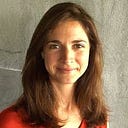A Mother’s Hope Is Universal
Yvonne is a young mother who lives in a small village down a winding path in the shadow of a large mountain just outside of the village of Djamdé. Her daughter Josephine had a fever, but Yvonne wasn’t worried. As she put it, “I’ve already called my Community Health Worker, and I know that she will come. If she can’t treat her, there is a great clinic just down the road where I know I can get the care my daughter needs. I have the tools I need to keep my daughter healthy.”
When I heard this I was beyond thrilled, because Yvonne sounded just like me.
I am the proud mother of two very kind — but also quite wild — young boys, ages 3 and 6 years old. When they have a fever, I’m concerned, but I’m generally not worried. I have a great doctor, in a nice clinic, just down the road where I can bring my sons to get the care they need. (I’m also married to a pretty great pediatrician, which doesn’t hurt either.) Just like Yvonne, I have the tools I need to keep my children healthy.
While Yvonne lives in Togo and I live in the United States, our children deserve access to the same things, including good healthcare.
But this access to healthcare is a relatively new reality for Yvonne. “I used to worry all the time that Josephine would get sick,” she told me. “When she did get sick, I would worry even more. I never had the money I needed to bring her to the clinic, and even when I could borrow the money, the clinic often didn’t have the medication she needed. Sometimes I would bring her to a traditional healer, but most often I would simply stay and home and pray that she got better and not worse.”
Yvonne felt completely powerless over the health of her child. As a mother myself, I cannot imagine how unbearable that must have felt.
I heard Dr. Dan Porterfield, President and CEO of the Aspen Institute, speak at a recent event. “No human being is any more human than anyone else…Therefore, we must stand up and say no, when we see one group being treated as less than human,” he told the gathered assembly. I thought of Yvonne. These words are more than a call to action. They are a creed to live by that requires not just sentiment but engaged effort to advocate for systems that make people their centerpiece. I believe that no one human being is any more human than another. I believe that my sons are no more human, nor are they more deserving, than Yvonne’s daughter Josephine.
At Integrate Health, we believe that health is a human right, that there should not be two standards of healthcare, one standard for Josephine and a different one for my children. We believe that everyone, everywhere deserves access to quality healthcare, and we fight every day to make that a reality.
But that is not the reality in Togo today. In Togo, 1 in 10 children die before their fifth birthday. The majority of these deaths are from diseases that are entirely treatable at a very low cost. More than half of child deaths in Togo are from malaria, which we can test and treat for $2. Why then are kids dying from these basic diseases at such a high rate? Because the tools that we need are not getting to where these kids are, because remote, rural communities in places like Togo are being forgotten.
But that is also why I am incredibly optimistic. Because we already have the tools that we need. We know how to solve this problem, and in fact we are solving it as we speak. Integrate Health works in some of the most remote communities in northern Togo to strengthen the primary healthcare system. We integrate high-quality care delivered by Community Health Workers in people’s homes with high-quality care delivered by nurses and midwives in public government clinics. In the communities where we work, we have seen child mortality drop over the past two years.
I was sitting recently with the Chief of the Village of Djamdé. He was expressing his gratitude for the beautiful renovations made to his village’s clinic. He explained, “When a person from this village travels to the clinic, they have to cross long distances under the hot sun. When they arrive hot, tired, and ill, they step into the clinic, and the first thing they feel is cool air from the newly installed ceiling fans. Before they receive any medical care, already they begin to feel better.”
To the Chief, the clinic renovations were about more than electricity and running water: they were about human dignity. They were about acknowledging that a sick patient deserves to feel cool whether they are in Togo or the United States. They were about acknowledging our commonality, our common humanity, and our common right to healthcare.
The success of Integrate Health shows that we can make the death of a child in Togo as rare and as shocking and as unacceptable as it is here in the US. That is our goal: one standard of healthcare, the same standard of healthcare, for everyone, everywhere. We can make sure that every mother feels like I do and like Josephine’s mother does, that they are not powerless when it comes to the health of their children. We can ensure that every child’s humanity is honored in the same way. Please join me in becoming part of the solution. We must fight every day to realize our beliefs, especially when they are being questioned. We must stand up and say no, when we see one group, any group, anywhere, being treated as less than human. We must create the world that we want our children to live in. Please join me.
